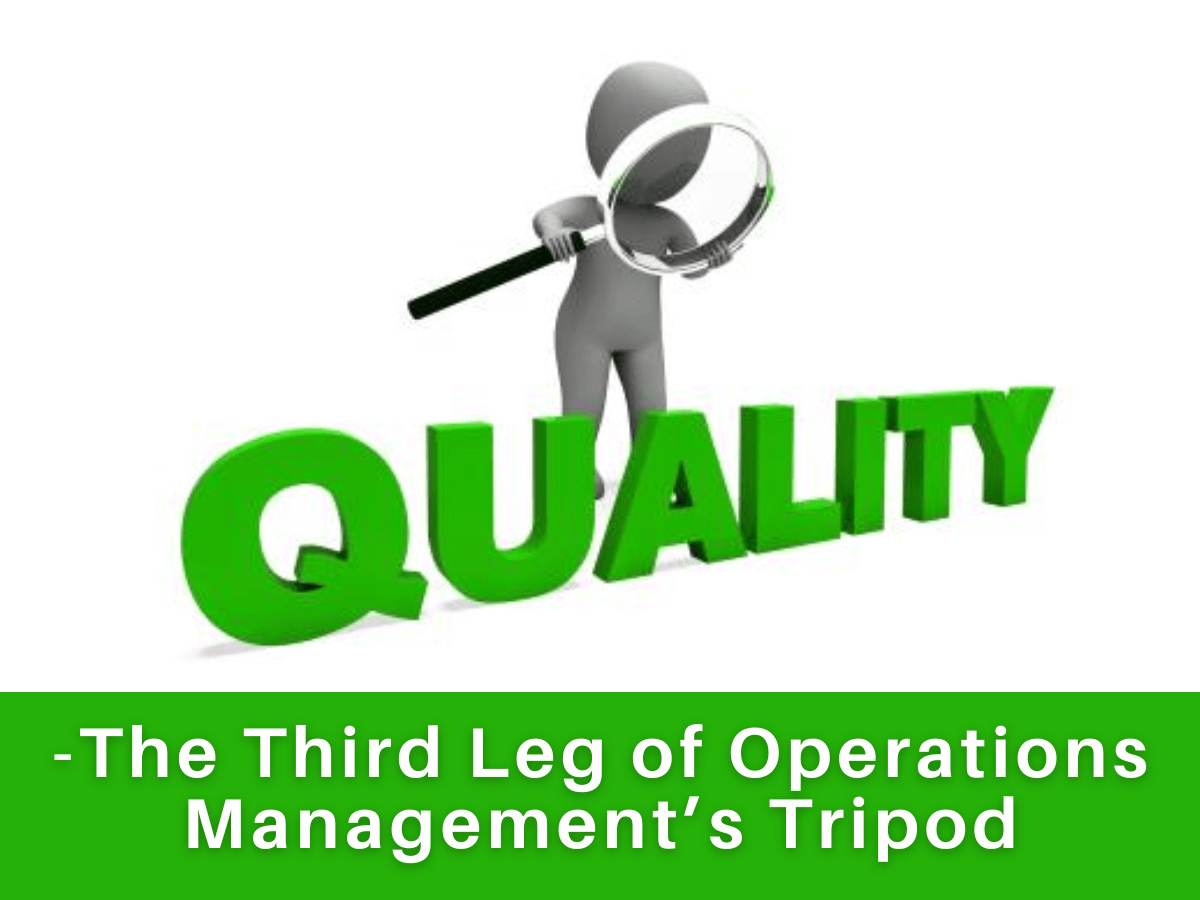Quality - The Third Leg of Operations Management’s Tripod

In our preceding discussions on operations management, we focused on the crucial issues of efficiency and cost. In this post, we will explore the equally important aspect of quality management. It is widely recognized that successful business operations require effective management of all three elements - Efficiency, Cost, and Quality - to achieve sustainable, competitive, and profitable outcomes in the long run. Quality management is therefore a vital component of the tripod that supports effective operations management.
Effective operations management is like conducting an orchestra - it requires skillful coordination of all the different players to create a harmonious and beautiful performance.- Unknown
What is Quality Management?
Quality management is the process of ensuring that products or services meet or exceed customer requirements and expectations. It involves setting quality standards, monitoring production processes, and taking corrective actions when necessary. Quality management is critical to the success of any organization, as it helps organizations deliver products and services that meet or exceed customer expectations, improve customer satisfaction and loyalty, and enhance the organization's reputation. Good Quality management also helps organizations identify and fix issues before they become larger problems, reducing the risk of product recalls, legal liability, and other costly consequences. Customers expect and demand high-quality products and services, and failure to meet those expectations can result in lost business and revenue.
Culture of Quality
Creating a culture of quality is essential for organizations that want to achieve and maintain high levels of quality. A culture of quality means that every employee in the organization understands and is committed to quality principles and practices. It requires strong leadership, effective communication, and a focus on continuous improvement. Quality professionals view quality as a continuous race to improvement with no finish line.
Examples of Successful Quality Management – Toyota and Apple
Toyota is a well-known example of a company that has successfully implemented quality management practices in the management of its business operations. In the 1980s, Toyota developed a quality management system called the Toyota Production System (TPS). TPS focuses on eliminating waste, improving efficiency, and continuously improving quality. The system has been so successful that it has been adopted by other organizations worldwide. Another example is Apple, which has built its brand reputation on delivering high-quality products that meet customer expectations.
Evolution of Quality Management
The concept of quality has evolved over time, and the evolution can be traced through four stages: quality inspection, quality control, quality assurance, and TQM.
Quality Inspection: In the early days of manufacturing, the focus was on inspection, which involved identifying and removing defective products after they were produced. This approach was reactive rather than proactive, and it did not address the root causes of quality issues.
Quality Control (QC): With the development of statistical process control (SPC) in the 1920s, the focus shifted to quality control, which involved monitoring and controlling the production process to prevent defects from occurring. This approach was more proactive, but it still relied on detecting and correcting defects rather than preventing them.
Quality Assurance (QA): In the 1960s, the concept of quality assurance emerged, which involved a systematic approach to ensuring that products met customer requirements. This approach focused on prevention rather than detection, and it involved developing quality systems and processes to ensure that products met established standards.
Total Quality Management (TQM): In the 1980s, the concept of TQM emerged, which built on the previous three stages and incorporated a holistic approach to quality management. TQM focused on continuous improvement, involving all employees in the process, and treating quality as a strategic business goal rather than just a technical issue. TQM also emphasized customer satisfaction and the importance of building long-term relationships with customers. Overall, the evolution of quality management reflects a shift from a reactive approach to quality (inspection) to a proactive approach (TQM) that emphasizes continuous improvement, prevention of defects, and customer satisfaction.
Keeping the Quality Up
Continuously improving and ensuring quality standards are at an all-time high is essential for any business to remain competitive in the market and continue to meet / exceed customer expectations. Here are some steps you can take to ensure that quality standards are not allowed to slip while attending to the everyday exigencies of running a business:
• Identify and analyze quality issues.
• Create an executable plan.
• Create a balanced team.
• Involve suppliers.
• Use quality tools.
• Implement quality standards.
• Communicate goals and progress.
• Continuously improve.
By implementing these strategies, businesses can improve product quality, meet customer expectations, and remain competitive in the marketplace.
Finally, to ensure effective quality management, it is important for organizations to invest in quality management training and education for their employees, from the top management to the frontline workers. This will help to ensure that everyone in the organization understands the importance of quality management and is equipped with the skills and knowledge needed to implement quality management strategies effectively. Quality is not just a program or discipline; it is a continuous race to improvement with no finish line.
Are You Looking to Expand Your Knowledge and Stay Up to Date with The Latest Trends in Quality Management?
Nigerian Seminars and Trainings offers a wide variety of Quality Management seminars and trainings to assist individuals and businesses in staying ahead of the curve. With hundreds of operations management training seminars and workshops annually, we have something for everyone!
Our quality management seminars cover topics ranging from Quality Inspection, Quality Control, Quality Assurance, Total Quality Management (TQM), ISO certifications and more. We also offer both virtual and in-person events so that you can maximize your learning opportunities in any environment.
Follow this link to check out our upcoming events today and start expanding your knowledge of Quality Management.






0 Comments